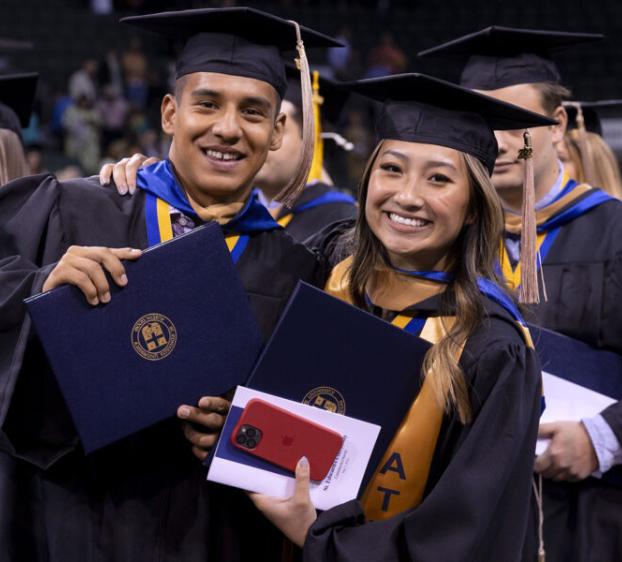Expand Your Knowledge of the Human Experience
As a Psychology major, you will develop a deep understanding of the human mind and behavior, as well as exceptional communication skills essential for work in social services, case management, consumer research and human resources.
Why earn your Psychology degree at St. Edward’s?
Whether you’re looking to become a psychologist, leader at a mental health facility or embark on a career in consumer research, one thing is certain: The advantages of your St. Edward’s education will prepare you to succeed. You’ll find opportunities in and outside the classroom to learn, give back and achieve your goals. And your mentors will support you every step of the way.
Take advantage of invaluable internship opportunities
In a field internship, you’ll apply your knowledge of psychology in a professional setting. While you’re there, you’ll complete a product – a handbook, institutional report or presentation – that the organization can keep using after you complete your internship.
Gain knowledge as a teaching assistant
Enjoy teaching and mentoring? You can serve as a teaching assistant, helping fellow students develop essential skills and techniques in a related field. Expand your communication skills and improve your own people skills by helping other students learn the material.
Build relationships with your professors
You’ll learn in small classes taught by award-winning professors who make a point of getting to know you and becoming your trusted advisors. They’ll help you identify and focus on your goals, and provide guidance and insight during and after your college years.

Reap the Rewards of Austin
Austin is a home base for numerous nonprofits and advocacy groups aiding the mental health and wellness needs of diverse communities. As a Psychology major, you’ll have access to internship opportunities at such organizations where you will learn how to make a difference for the causes you care about.
What do our graduates do?
Psychology majors go on to a variety of careers and graduate schools from St. Edward’s. Here’s a sample.
- Research and planning analyst for a community college district in San Diego.
- Coordinator in the People Department on the flight operations/technology recruiting team at Southwest Airlines.
- Chief of staff at a global tax firm.
- Research assistant at the Terrorism Research Initiative.
- Psychometrician at Elsevier, a global information analytics company.
- Director of Forensic and Family Services for Williamson County Children’s Advocacy Center.
- Policy analyst at the Texas Criminal Justice Coalition.
- Graduate students at The University of Texas at Austin, Stanford University, Columbia University, the University of Houston and more.
Explore Details About a Degree in Psychology
Major Requirements: The BA in Psychology requires 31–32 hours of major courses, which include a combination of introductory and advanced topics. In addition, students choose 9 hours of career-emphasis elective courses that help prepare them for future interests, such as graduate study or their career path in psychology.
Electives: Students are free to complete 26 hours of elective courses in any area of study they choose. These courses do not have to relate to the Psychology degree.
General Education Requirements: The Psychology degree requires 57 hours of general education courses that students complete over four years in addition to their major courses and electives.
View and download the full degree plan for our Psychology major (PDF).
A few examples of the Psychology major courses students take:
- Social Psychology – Examines how people interact with and are influenced by others, including topics such as conformity and obedience, nonverbal behavior, person perception, leadership, and attraction.
- Abnormal Psychology – Addresses the causes, consequences, and cures for maladaptive behavior, such as depression, mood disorders, antisocial personality disorder, or schizophrenia.
- Biopsychology – Delves into the function and anatomy of the nervous system and the role it plays in directing perception, emotion, thought, memory, and motor behavior.
Experiential Learning and Research
As a Psychology major, you’ll graduate with practical experience you can put on your resume. Whether you choose a research assistantship, teaching assistantship or field internship, you’ll get a head start on your career.
For example, St. Edward’s students have recently explored how cues to status affect college students’ preferences for relationship partners, and how different types of distractions affect working memory. To get the full research experience, you’ll travel to a conference like the Southwestern Psychological Association or the Society for Personality and Social Psychology and present your work. These meetings give you a chance to see research that other undergraduates, graduate students and professors have conducted, network with graduate school in mind, and decide if a career in research is right for you.
Your internship depends on what you’re curious about: child development, mental health and mental illness, counseling, criminal justice, LGBTQIA+ issues or politics, to name a few. Students have recently interned at these Austin organizations:
- Center for Child Protection
- Lone Star Victims Advocacy Program
- Austin Family Institute
- National Alliance on Mental Illness
- QWell Community Foundation
- Therapists in private practice – several of them St. Edward’s graduates
Whatever setting you choose, you’ll discover how the psychology you learned in class translates into the world of work, and you’ll build your portfolio of professional skills.
The study of psychology enhances our understanding of how people think, feel, and behave. It provides valuable insight for every area of work and life, and aligns with any field of study. Students interested in learning more about how the human mind works and why people do what they do are encouraged to pursue a minor in psychology, which requires 18 hours of coursework
Required Courses:
- General Psychology (PSYC 2301)
- Lifespan Development (PSYC 2310)
- Social Psychology (PSYC 3319)
- 1 lower-division Psychology elective (PSYC 2300+)
- 2 upper-division Psychology electives (PSYC 3300+)
At St. Edward’s, our faculty are outstanding scholars, thought leaders, teachers and mentors who bring energy and enthusiasm to our vibrant learning community. They take pride in getting to know you, helping you achieve your goals and celebrating your successes.
View a list of our faculty members and their contact information on the Department of Psychology and Behavioral Neuroscience webpage.

Earn Two Degrees in Five Years
With our Accelerated Graduate Pathways, you can complete your BA in Psychology and one of six master’s degrees in as little as five years, saving time and money. See details and requirements.
- Psychology to MEd in Applied Behavior Analysis
- Psychology Major and Education Studies Minor to MEd in Applied Behavior Analysis
- Psychology to MS in Organizational Leadership
- Psychology to Master of Business Administration (MBA)
- Psychology to MS in Business Analytics
- Psychology to MS in Digital Marketing and Analytics
Success coaches and academic advisors guide you through undergraduate and graduate courses to maximize benefits.
